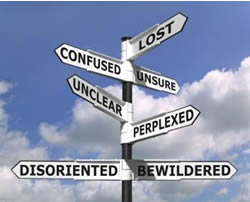Gretchen Rubin* says when it comes to making tough decisions, the answer must always be the one that reflects your temperament, interests and values.
 One common stumbling block to happiness is the need to make a tough decision.
One common stumbling block to happiness is the need to make a tough decision.
To decide between apples and oranges, to weigh pros and cons, to think about what we will need and want in the future, to understand our real values…it’s tough.
People often send me emails to explain their situations and ask for my thoughts.
I can’t give advice to a particular person, but here are some mantras and questions I use when I’m facing a difficult decision in my own life.
When I’m trying to make a tough choice, I say to myself: “Choose the bigger life.”
In a particular situation, people would make different decisions about what the ‘bigger life’ would be.
However, when I ask myself that question, it always helps me see the right answer for myself.
For instance, as a family, we were trying to decide whether to get a dog.
My daughters desperately wanted a dog, but I kept thinking about the commitment, inconvenience, errands, and all the downsides.
The pros and cons list felt equally balanced.
Then, when I thought: “Choose the bigger life,” I realised that the bigger life for my family was to get a dog.
That wouldn’t be true for everyone, but it was true for us.
We’re so happy we have our dog, Barnaby.
Another question to consider: Is this decision likely to strengthen my relationships with other people?
Strong relationships with other people are a key — maybe the key — to happiness, so decisions that help build or strengthen ties are likely to boost happiness.
Of course, sometimes we make decisions, such as to move to a new city or switch to a new profession, that put us in a place where we have few relationships.
That can be worthwhile, absolutely, but it’s worth considering the time, effort, and energy needed to create new relationships.
I also ask myself: “Does this decision help me to follow my personal commandment to be Gretchen?”
Of course, everyone should substitute their own names.
I want to shape my life to reflect my temperament, interests, and values.
I ask myself: Am I making this decision to be Gretchen?
Or because I want to impress other people, please someone else, pretend that I’m different from the person I actually am, or deny a truth about myself?
Another way to think about being Gretchen is to remind myself: “I want to accept myself, and expect more from myself.”
Is a particular course of action allowing me to expect more from myself — meaning it’s scary in a positive way — that will allow me to grow?
Or does this course of action mean I’m not accepting myself — meaning it feels wrong for me in a way that I should respect?
It can also be helpful to consider whether, when I contemplate a particular course of action, do I feel energised or drained?
Sometimes it’s great to push ourselves to do something novel, challenging, or scary.
Sometimes, a bad feeling is an indication that a decision doesn’t sit right with us.
Unfortunately, it’s often very hard to tell the difference between those two feelings.
This takes a lot of deliberation.
I try to avoid false choices.
Often, we try to make difficult decisions seem easier by boiling down our choices to two clear paths, when in fact there may be many paths from which to choose.
Maybe you’re thinking of giving yourself a choice between two options: Should I stay in my current job full time, or should I quit to write the novel I’ve always to write?
Ask whether those the only two options? Are there other options that I haven’t considered?
Relatedly, when appropriate, I reassure myself: “There’s no wrong choice here.”
When I’m facing two good options, I remind myself that a choice becomes the right choice as we live it.
As we have good experiences, make new relationships, go down a particular path.
Here’s one last strategy.
As I mentioned, I often get emails from people saying: “Here’s my situation, here are my choices, what should I do, how do I choose?”
It’s quite clear to me, from reading what they’ve written, that they know what choice they want to make.
So I write back: “I can’t give advice, but it sounds to me as though you already know what you want to do.”
The way they explain the situation and the decision absolutely tips their hand — and that’s fine.
So if you’re not sure what you want to do, try drafting an email to explain the situation, send the email to yourself, wait a week, then read it.
Maybe you know what you want, more than you’ve admitted to yourself.
*Gretchen Rubin is the author of the New York Times bestsellers, Better Than Before, The Happiness Project, and Happier at Home. She writes about happiness and habit-formation and can be followed on Twitter @gretchenrubin
This article first appeared on Gretchen’s blogsite.











